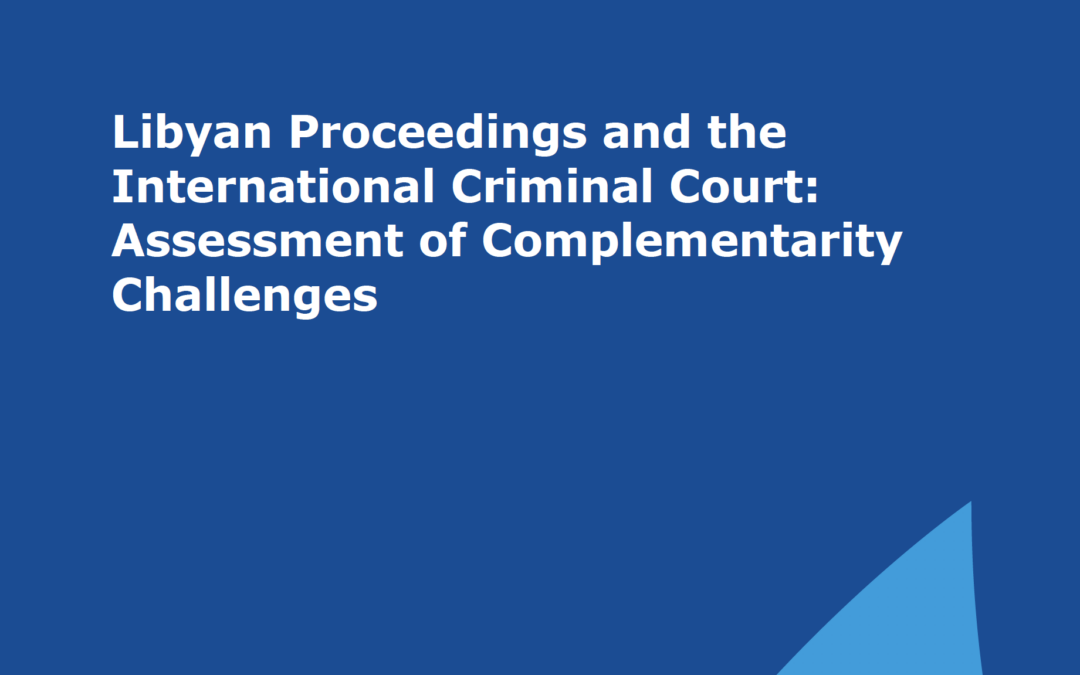
Apr 8, 2020
In a briefing paper analyzing complementarity challenges between Libyan proceedings and the International Criminal Court (ICC), the ICJ today called for full compliance with Libya’s obligations under international law to penalize, investigate and prosecute crimes under international law.
The ICJ calls for greater consideration to be given to fair trial violations and other shortcomings of the Libyan criminal justice system in the context of future cases and in any review of admissibility decisions before the ICC.
The briefing examines the standards applied by the ICC in determining the admissibility of the Libya-related cases, and assesses such standards in light of Libya’s obligations under international law and the findings of the ICJ’s report Accountability for Serious Crimes under International Law in Libya: An Assessment of the Criminal Justice System.
International fair trial standards are extensively violated in Libya, as testified by the case against 37 former Gadhafi officials, whose fair trial rights have been breached throughout the domestic proceedings.
Moreover, in prominent cases such as that concerning the 1996 massacre of 1200 prisoners in the Abu Salim prison, domestic courts failed to ensure accountability for crimes under international law by applying statutes of limitations.
The ICC has considered admissibility challenges brought by Libya in respect of the cases against Saif al-Islam Gadhafi (Muammar Gadhafi’s son) and Abdullah Al-Senussi (former head of the Military Intelligence), determining Gadhafi’s case admissible and Al-Senussi’s case inadmissible.
Warrants of arrest remain outstanding against Al-Tuhamy Mohamed Khaled (former head of the Libyan Internal Security Agency) and Mahmoud Mustafa Busayf Al-Werfalli (commander in the Al-Saiqa Brigade in the Libyan Arab Armed Forces), who are both at large.
“Libya’s criminal justice system is unable to ensure accountability for crimes under international law,” said Said Benarbia, the ICJ’s MENA Programme Director.
“To do so, courts should be able to operate free from fear or intimidation, and to apply laws that fully comply with Libya’s obligations under international law, including those on fair trial rights.”
The briefing highlights that, in addressing the admissibility of cases before the ICC, full consideration should be given to whether Libya fulfils its international obligations in terms of penalization of crimes under international law and guaranteeing that domestic proceedings are carried out in line with international fair trial standards.
“Until the Libyan proceedings are able to dispense justice consistent with international law and standards, impunity will continue to prevail in the country,” said Kate Vigneswaran, the ICJ’s MENA Programme Senior Legal Adviser.
“To contribute to dismantling such impunity, proceedings before the ICC should fully take into account and address fair trial violations and other obstacles that continue to impede the effective functioning of the Libyan proceedings.”
Contacts
Said Benarbia, Director of the ICJ Middle East and North Africa Programme, t: +41 22 979 3817; e: said.benarbia(a)icj.org
Kate Vigneswaran, ICJ Senior Legal Adviser, t: +31 62 489 4664, e: kate.vigneswaran(a)icj.org, twitter: @KateVigneswaran
Full English language briefing paper, in PDF: Libya-ICC assessment-Advocacy-Analysis Brief-2020-ENG
Full Arabic language briefing paper, in PDF: Libya-ICC assessment-Advocacy-Analysis brief-2020-ARA
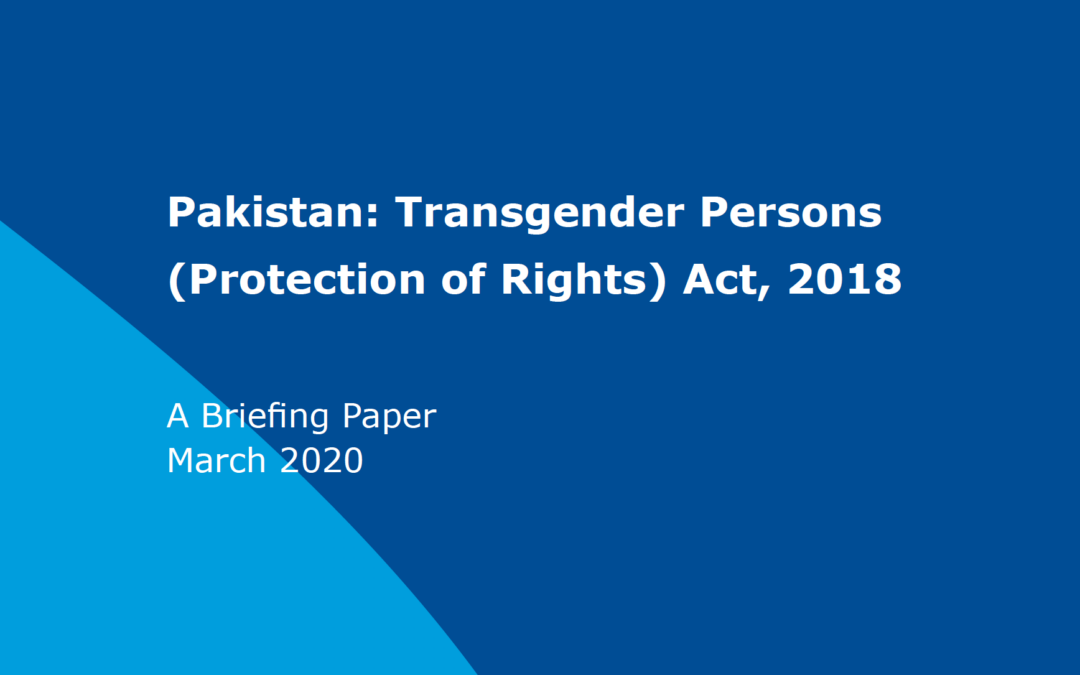
Mar 31, 2020
Today, on the International Transgender Day of Visibility (TDOV), the ICJ has released a briefing paper on Pakistan’s Transgender Persons (Protection of Rights) Act, 2018.
The briefing paper analyzes some of the more salient provisions of the Act in light of Pakistan’s obligations under international human rights law.
The paper specifically addresses: the definition of transgender people provided in the act; the procedures for legal gender recognition stipulated by the law; the provisions on anti-discrimination and harassment; the new criminal offence related to begging; and the adequacy and effectiveness of enforcement mechanisms, among other issues.
“The passage of the law is a testament to the hard work and struggle of the Pakistani transgender and queer communities, as well as the support and solidarity offered at different points by other social and civil society groups,” said Frederick Rawski, ICJ’s Asia Director.
“However, for the promise of the law to be realized in a manner that fully respects the human rights of transgender people, it is essential that this process does not end with the enactment of the legislation, and that authorities take an inclusive and proactive approach towards its enforcement.”
Under the law, transgender people have the right to have all their official documents changed and reissued in line with their self-identified gender, and the Act provides for legal recognition of gender identity as a matter of right without any medical or diagnostic requirements.
“This a crucial improvement in the legal status of transgender people in Pakistan, making the Act one of the most far-reaching in the region, if not world over,” added Rawski.
“Other countries that are grappling with similar legislation have much to learn from how the Pakistan’s Transgender Persons (Protection of Rights) Act, 2018 has responded to the question of legal gender recognition.”
However, there remain a number of limitations and omissions in the law, which could hamper the full protection of the human rights of transgender people in the country.
Some of them include: the conflation of transgender and intersex identities; the criminalization of “employing” or “using” transgender people for begging, despite evidence that such laws are used to harass and blackmail transgender people; the delay in formulating rules under the law to ensure its effective implementation; and the lack of adequate enforcement mechanisms.
In addition, it is of concern that other discriminatory legal provisions that violate the rights of transgender people, such as section 375 of the Pakistan Penal Code (PPC), which defines rape in an exclusionary and gendered manner, namely, by making it a crime that can only be committed by a man against a woman, and section 377 of the PPC, which criminalizes “carnal intercourse against the order of nature” are still in force.
The analysis in this paper provides some guidance to policy makers and members of parliament on how the law can be further strengthened.
The recommendations should be implemented, both at national and provincial levels, to make the Transgender Persons (Protection of Rights) Act the more consistent with Pakistan’s obligations under international law.
Contact:
Frederick Rawski (Bangkok), ICJ Asia Pacific Regional Director, e: frederick.rawski(a)icj.org
Reema Omer, ICJ Legal Advisor (South Asia) t: +447889565691; e: reema.omer(a)icj.org
Download
Briefing Paper Pakistan-Transgender-Advocacy-Analysis brief-2020-ENG (PDF)
Executive Summary Pakistan-Transgender-Summary-Advocacy-Analysis-brief-2020-ENG-URD (in English and Urdu, PDF)
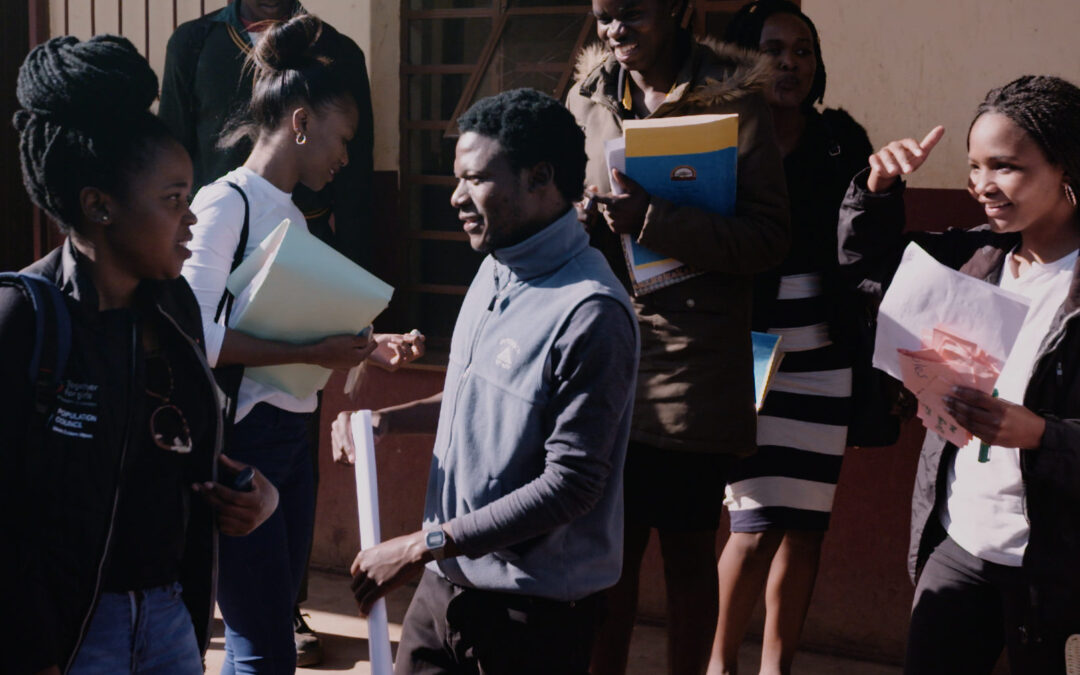
Mar 15, 2020
The briefing paper Access to Challenges faced by Victims and Survivors of Sexual and Gender-Based Violence in Eswatini comes in the wake of the 2018 adoption of the country’s Sexual Offences and Domestic Violence (SODV) Act.
This law followed years of advocacy from civil society and women’s human rights organizations in the Kingdom. It is a landmark piece of legislation aimed at ending sexual and gender-based violence (SGBV) in the country.
However, the effective investigation and prosecution of SGBV crimes presents complex challenges to the justice system in Eswatini.
It will take more than the passage of a new law to protect women in Eswatini and strengthen access to justice for women and girls in the country.
Gender stereotypes and gender bias, sometimes based on traditional, religious and cultural norms continue to permeate the justice system, preventing women and girls from effectively accessing justice for SGBV.
Download
Eswatini-SGBV Report-Advocacy-Analysis brief-2020-ENG (full paper, in PDF)
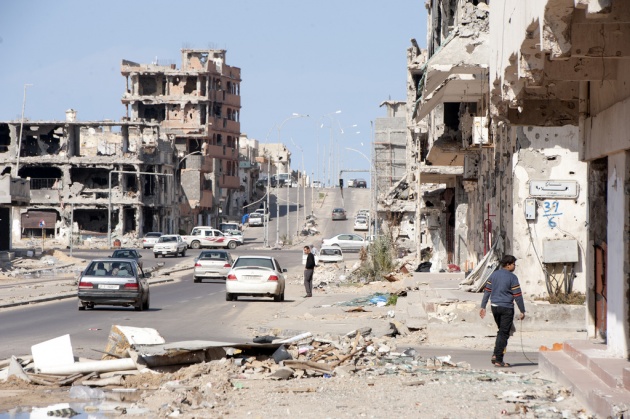
Jan 17, 2020
The 19 January 2020 Berlin Peace Conference should prioritize accountability for crimes under international law committed in Libya and ensure that any resulting Political Agreement (PA) lays the foundations for the rule of law to be established and for human rights to become firmly entrenched in Libya, the ICJ said today.
Upholding of international human rights and humanitarian law is one of the six baskets of activities provided for by the Berlin process to end the conflict in Libya.
The other baskets relate to the Libyan-led political process; the implementation of the arms embargo, security and economic reform; and, most immediately, securing a ceasefire.
Earlier this week, efforts to end nine months of armed conflict between the Government of National Accord (GNA) and the National Libyan Army (LNA) failed to materialize, with the LNA leader refusing to sign a ceasefire.
“The Berlin Conference must send an unequivocal message to all parties that impunity will not be the price of peace,” said Said Benarbia, the ICJ’s MENA Programme Director.
“Peace can only be achieved when State officials and members of armed groups responsible for past and ongoing human rights atrocities are held to account, and when the States that have systematically violated the United Nations-imposed arms embargo are also held to account,” Benarbia added.
The ICJ calls on all those involved in the Berlin process to ensure that any resulting PA include provisions on the right to truth, justice, reparation and guarantees of non-recurrence, including commitment to institutional reforms to secure accountability and victims’ rights.
The process should also support calls by civil society organizations, the UN Special Representative of the UN Secretary-General in Libya, and the Office of the High Commissioner for Human Rights for the establishment of an accountability mechanism for Libya at the 43rd session of the UN Human Rights Council.
“Accountability is a key, not an obstacle to the establishment of the rule of law in Libya,” said Kate Vigneswaran, the ICJ’s MENA Programme Senior Legal Adviser.
“The Berlin Conference should support the establishment of a Commission of Inquiry or similar mechanism with a mandate to document human rights violations and abuses in the country, identify those responsible for them, and collect and preserve evidence for use in future criminal proceedings,” she added.
In a briefing published today, the ICJ also urged all parties involved in the Berlin process to ensuring that any resulting PA provide: for armed and security forces to be subordinated to civilian authorities; for any process of integrating officials and members of armed groups in the State’s armed and security forces to be conducted through adequate vetting standards and processes; for the right of all Libyans to participate in the conduct of public affairs to be enshrined and fully complied with; for the independence and accountability of the judiciary and the Office of the General Prosecutor to be secured; and for universally recognized human rights to be protected in Libya’s Constitution and laws.
Contact
Said Benarbia, Director of the ICJ Middle East and North Africa Programme, t: +41-22-979-3817; e: said.benarbia(a)icj.org
Kate Vigneswaran, ICJ Senior Legal Adviser, t: +31624894664, e: kate.vigneswaran(a)icj.org, twitter: @KateVigneswaran
Libya-ICJ recommendations-Advocacy-Analysis brief-2020-ENG (full briefing paper, in PDF)
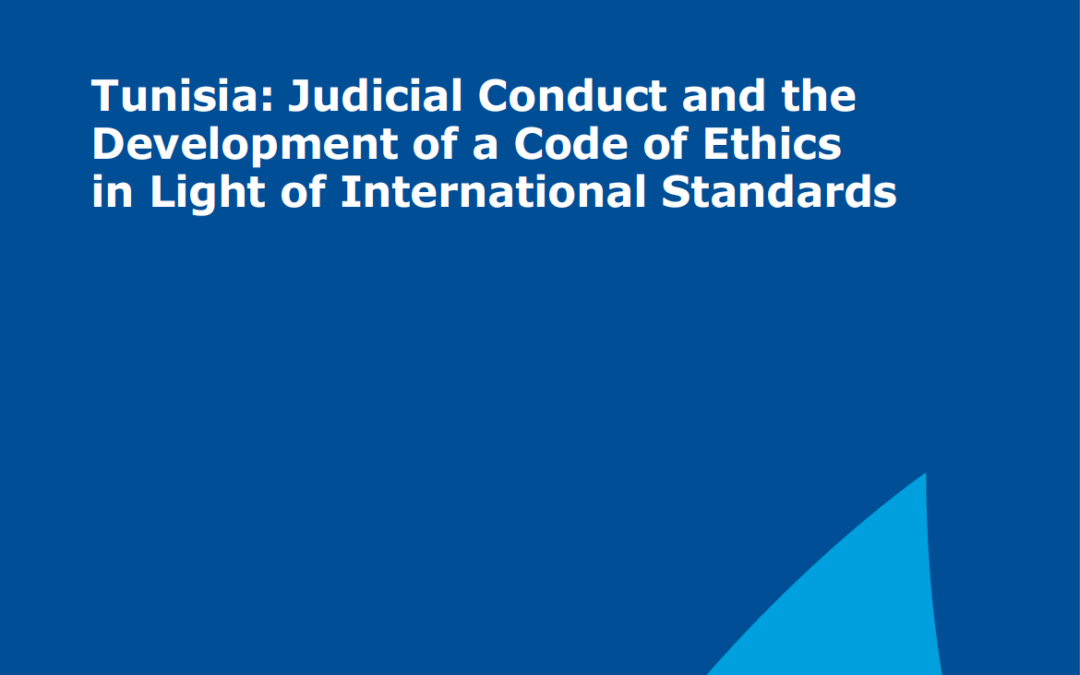
Nov 27, 2019
Tunisian authorities must ensure that the process of developing and adopting a Judicial Code of Ethics and Judicial Conduct in the country is inclusive and transparent, said the ICJ in a briefing paper released today in Tunis.
The Code must also align with international standards and be effectively and independently implemented to secure judicial independence and accountability, the memo Tunisia: Judicial Conduct and the Development of a Code of Ethics in Light of International Standards (available in English and Arabic), adds.
In the paper, the ICJ recommends the adoption of a clear, transparent and inclusive procedure for developing and adopting the Judicial Code, and for its content to conform to the UN-endorsed Bangalore Principles of Judicial Conduct.
“Adopting a Code of Ethics and Judicial Conduct is a unique opportunity for Tunisian authorities to bolster judicial independence and restore public confidence in judicial institutions,” said Saïd Benarbia, Director of the Middle East and North Africa Programme at the ICJ.
“The authorities should get both the process and the content right, and ensure that such a code provides detailed guidance to judges on what kind of conduct is expected of them,” he added.
The adoption of a Code of Ethics has the potential to remedy the shortcomings of the current legal framework on judicial independence and accountability.
Organic Law No. 67-29 on the Judiciary, the High Judicial Council and the Statute for Judges, even as modified by Organic Law No. 2013-13, does not adequately or sufficiently provide for the guarantees to uphold judicial individual independence, the criteria and procedures for recusal or disqualification, or the need to avoid use of one’s office for private gain.
This is particularly problematic given that the current disciplinary procedures are inconsistent with international standards and best practices for judicial independence and impartiality, including because of the role of the Minister of Justice in initiating such procedures.
Against this background, the ICJ calls on the Tunisian authorities to:
- Ensure that the Judicial Code is established in law as the basis on which judges will be held to account professionally;
- Ensure that the principles of independence, impartiality, integrity, propriety, equality, competence and diligence are clearly incorporated in the Judicial Code of Ethics in accordance with the Bangalore Principles and other relevant international standards;
- Amend Organic Law No. 67-29 to ensure that judges in Tunisia enjoy personal immunity from civil suits for monetary damages for improper acts or omissions in the exercise of their judicial functions; instead, in appropriate cases, persons who suffer losses as a result of such improper acts or omissions should be able to make a claim for compensation against the State itself;
- Ensure that the law and the Judicial Code clearly and precisely define the forms of misconduct that may lead to a judge’s discipline;
- Provide, in a manner consistent with independence of the judiciary, for individual judges to be held responsible, through disciplinary or criminal proceedings or both as appropriate, for perpetration of or complicity in violations of human rights, international humanitarian law and for judicial corruption; in this regard clearly prescribe the offences that could give rise to disciplinary liability for such acts or omissions, in line with international law and standards; and
- Ensure, in defining grounds for disciplinary action, that the fundamental rights and freedoms of judges are upheld and respected.
Contact
Saïd Benarbia, Director of the ICJ Middle East and North Africa Programme, t: +41.22.979.3817, e: said.benarbia(a)icj.org
Additional information
ICJ Commissioner Martine Comte led the delegation that met with different Tunisian authorities and justice actors this week in Tunis in order to present ICJ’s memo and discuss its findings and recommendations. The ICJ delegation met with Mr. Youssef Bouzeker, President of the Tunisian High Judicial Council, and other senior officials of the Tunisian Ministry of Justice and of the Tunisia Bar Association.
Tunisia-Code of Ethics-Advocacy-Analysis Brief-2016-ENG (full paper, in PDF)
Tunisia-judicial code-news-press release-2019-ARA (full story, Arabic version, in PDF)
Tunisia-Code of Ethics-Advocacy-Analysis Brief-2016-ARA (full paper, Arabic version, in PDF)









